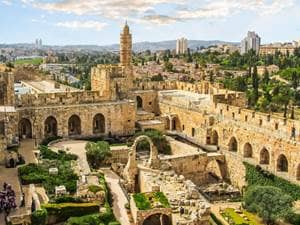
Jerusalem is where the church started. In Acts 1:8, Jesus told His disciples to preach the gospel worldwide but to start at Jerusalem. In His grace, God extended the offer of forgiveness to the very people who were most responsible for Jesus’ death. He granted the very city where Christ was crucified the honor of becoming the church’s birthplace. On the Day of Pentecost, the Holy Spirit came to live in the disciples gathered in Jerusalem and in His power, the church started.
After Jesus’ resurrection and ascension, the gospel started to spread, and believers came together in various cities. These gatherings were called churches, and the church in Jerusalem was the group of believers who lived there. The first record of these churches comes in the book of Acts, which follows the apostles’ journey, particularly Paul, as they evangelize the world, ministering to the churches in several places. The apostles wrote letters, or epistles, to these said churches. For example, Ephesians is a letter to the believers gathered in Ephesus. The church in Jerusalem played a remarkable role in the conversion of the Jewish religious leader Saul. Following his conversion, Saul was given a new name and became the apostle Paul.
Before this, Saul was persecuting the church at Jerusalem so much that the believers were forced to flee to other towns, as detailed in Acts 8:1. He was also directly involved with Stephen’s execution, the first Christian martyr. Stephen was a deacon in the church and one of those who suffered there. Even as believers left persecution, the apostles stayed, and Jerusalem became a home base for the Jewish church for years. Another notable event linked with the church in Jerusalem is Peter’s vision of the Gentiles obtaining salvation. In Joppa, Peter had a vision about unclean animals under Jewish law, and God told him to eat and kill said animals. The message was that God declared these animals and pagan Gentiles to be clean now.
The Jews in the church shouldn’t be scared to accept Gentile believers into the church because, in Jesus, all are made clean. God had accepted the Gentiles. This new thought process was immediately put to the test as Peter was called to a Roman centurion’s home, who believed in Jesus along with his entire household, as detailed in Acts 10. Peter shared these events with the church in Jerusalem, as the Jewish believers there were skeptical at first. However, Peter told them he had witnessed a genuine conversion of those Gentiles along with a sign, as detailed in Acts 11:15. The church at Jerusalem then accepted the belief that Gentiles were brothers in Christ.
Why is Jerusalem known as the City of David?
In the Old Testament, the first time Jerusalem was called the “City of David” is found in 2 Samuel 5:7. In this story, David was made king of the entire nation of Israel and led his army to take Jerusalem from the Jebusites. After he won the city, David took residence in the fortress, calling it the City of David. He built up the area surrounding it from the terraces inward and became more powerful because God was with him. Although Jerusalem was already a city, it became known as the City of David after David defeated it. During his reign, David molded it into a more significant urban area. Later, the ark was brought to Jerusalem, and David made plans for a temple to be built under the direction of Solomon, his son.
The phrase “City of David” is used to describe Jerusalem 45 times in the Old Testament. In the New Testament, the phrase is found twice, although it refers to Bethlehem, where David was born. The practice of naming a city by its leader’s name was common in the ancient Mediterranean world. Heshbon was the city of Sihon, named after its king, and 1 Samuel 15:5 refers to the city of Amalek. Some cities took the name of their founder or a local deity. Jerusalem has been known as the City of David for over 3,000 years as God has continued to keep the memory of David alive for generations. There’s also a close association between King David and Jesus, the son of David, as detailed in Matthew 1:1. Both were born in Bethelem and died in Jerusalem, coming from obscurity to be kings.
Revelation 22:16 reminds us that Jesus was a descendant of David from the tribe of Judah, where David first reigned. In fact, the City of David is where Jesus is to reign in the future. In the final chapters of the Bible, we read of a new Jerusalem, where God’s people will reign eternally, marking the earthly City of David with eternal honor.
Should Christians go on a pilgrimage to Jerusalem?
A pilgrimage is a journey to a place considered sacred as an act of religious devotion. If at all possible, Muslims are required to make a pilgrimage to Mecca, Muhammed’s birthplace, as part of their religious duty as Muslims and as a way of helping ensure paradise for themselves. Christianity doesn’t have these requirements, and any act performed for the purposes of ensuring eternal life for ourselves is wrong, including making a pilgrimage to Jerusalem. In Titus 3:5, we read that God saved us but not on the basis of our righteous deeds. He saved us according to His mercy and the washing and renewing of the Holy Spirit.
Many Christians desire to trip to Israel to see the place we read about in the Bible. Visiting the temple ruins, Bethlehem, and the empty tomb can be spiritually impacting. With the relative ease of modern transportation, this trip is attainable for many and thousands of people travel to the Holy Land annually. However, some see their trip to Jerusalem as a pilgrimage on par with a Muslim’s voyage to Mecca, but when we see Jerusalem that way, we’re entering dangerous territory. When we remove or add anything from Christ’s finished work in purchasing our salvation, we’re guilty of perverting the gospel. A pilgrimage to Jerusalem won’t change one thing about our standing with God, according to Ephesians 2:8-9.

